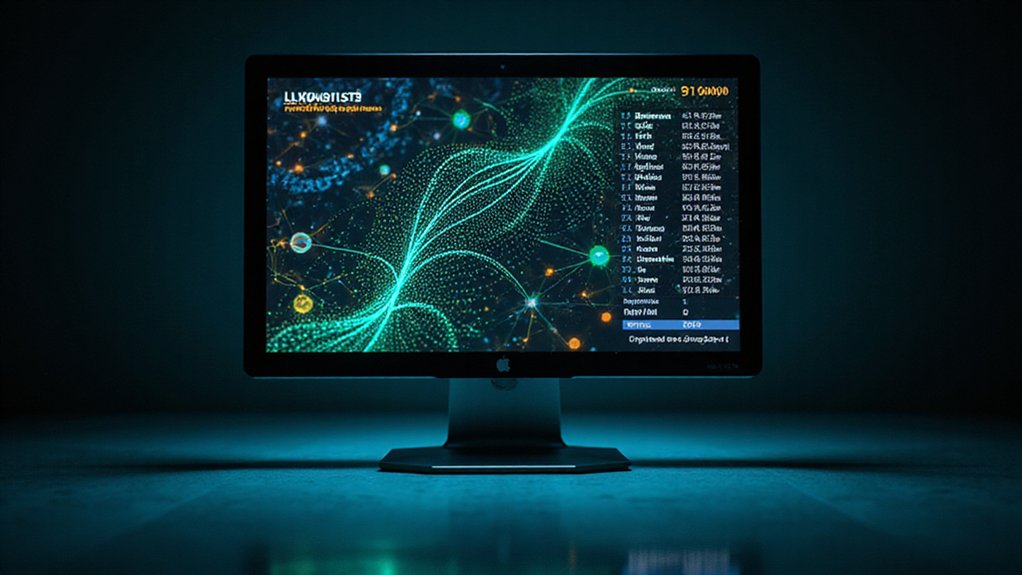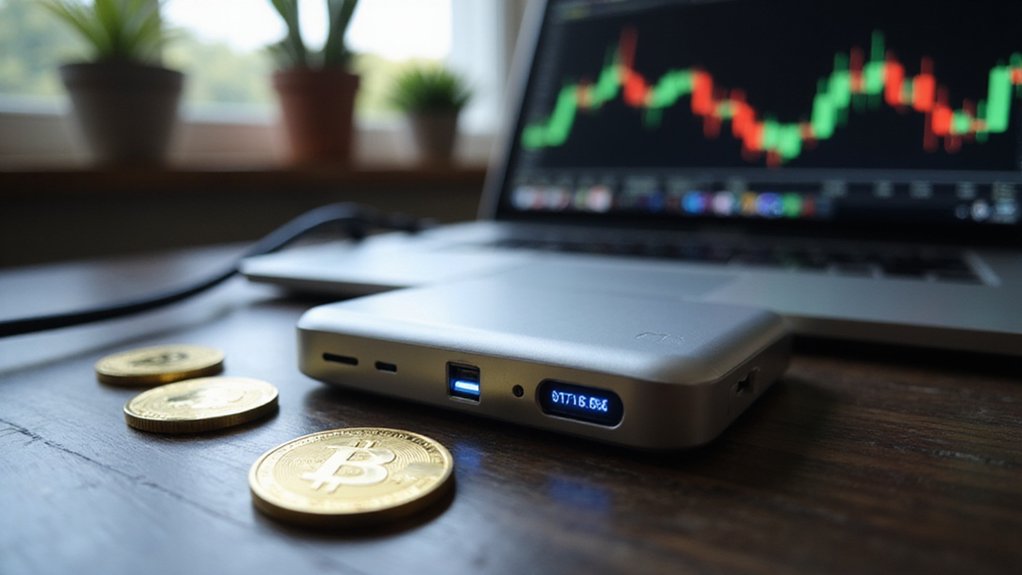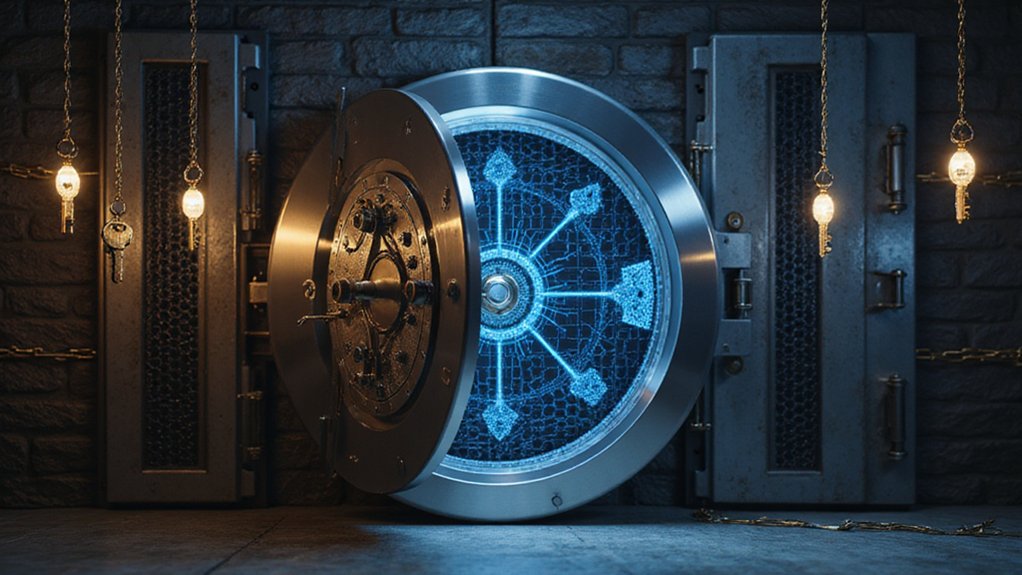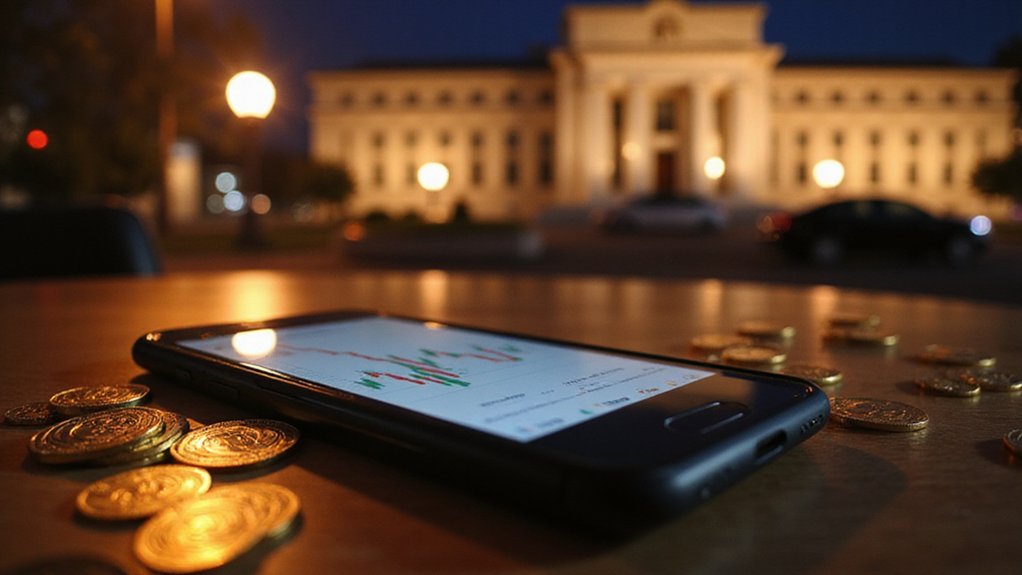Etherscan serves as Ethereum’s blockchain explorer, transforming cryptographic transactions into searchable data where users can track any wallet address, smart contract, or transaction hash with forensic precision. Simply input an address to reveal thorough transaction histories, token holdings, and interaction patterns—turning every Ethereum wallet into an open ledger that would make traditional bankers deeply uncomfortable. Users can also monitor gas fees, examine smart contract code, and analyze token distributions across the network. The platform’s extensive toolkit reveals depths that reward closer examination.

Transparency, that elusive concept Wall Street spent decades perfecting the art of avoiding, arrives with brutal clarity on Ethereum’s blockchain through Etherscan—a block explorer that strips away the comfortable opacity traditional finance has long cherished.
This free platform functions as Ethereum’s definitive transaction ledger, allowing users to monitor real-time blockchain activity with unprecedented granularity. By inputting transaction hashes, one can instantly view sender and recipient addresses, timestamps, gas consumption, and confirmation status—information that would require congressional subpoenas to extract from traditional financial institutions.
The address lookup feature transforms any wallet into an open book, displaying balances, transaction histories, and token holdings (including those increasingly ubiquitous NFTs that somehow convinced people digital receipts constitute ownership). Users can audit wallet activities without requiring private keys, making it invaluable for verification purposes and tracking fund movements across the network.
Smart contract analysis represents Etherscan’s most sophisticated capability, enabling users to examine contract details, view verified source code, and interact directly with deployed contracts. This transparency allows developers and auditors to scrutinize contract integrity—a revitalizing departure from traditional finance’s “trust us, we’re professionals” approach.
Token tracking encompasses ERC-20 tokens, ERC-721 NFTs, and other Ethereum-based assets, providing transfer histories, holder statistics, and distribution analytics. The platform reveals token creation details with the same ruthless transparency that would make traditional market makers break into cold sweats. The Token Approval Checker identifies potentially dangerous permissions granted to smart contracts, allowing users to revoke unnecessary approvals that could compromise wallet security.
Gas fee monitoring displays real-time pricing and historical trends, helping users optimize transaction timing and costs. The Gas Tracker prevents the common mishap of underpaying fees and watching transactions languish indefinitely—though explaining gas fees to newcomers remains an exercise in patience.
Block exploration features allow detailed examination of individual blocks, including miner information, timestamps, and transaction counts. Users can search by block number or hash, facilitating network activity analysis and blockchain growth tracking. The platform displays block structure details that reveal how transactions are grouped and processed within each block. This cryptographic security ensures that once data is recorded in blocks, it becomes virtually impossible to alter without detection across the entire network.
Event logs provide deeper insights into smart contract-generated events, enabling monitoring of decentralized application activity and contract behavior analysis. This granular data supports debugging efforts and performance tracking for Ethereum-based services, creating accountability mechanisms that traditional finance continues to resist with remarkable tenacity.
Frequently Asked Questions
Is Etherscan Free to Use or Does It Require Payment?
Etherscan operates on a freemium model—basic blockchain exploration remains entirely free, while premium API services require payment.
Casual users can search transactions, monitor wallet balances, and examine smart contracts without financial obligation. However, developers seeking high-volume API access or enterprise-grade data integration face rate limits that necessitate paid subscriptions.
The platform’s monetization strategy cleverly separates transparency (free) from commercial utility (paid), ensuring public accessibility while capturing professional revenue streams.
Can I Use Etherscan to Track Other Blockchain Networks Besides Ethereum?
No, Etherscan exclusively serves the Ethereum network—a limitation that becomes rather conspicuous when one considers the multichain reality of modern DeFi.
Users seeking cross-blockchain analysis must turn to alternatives like Blockchair or employ multiple specialized explorers. This narrow focus, while enabling deep Ethereum insights, leaves traders juggling various platforms to monitor portfolios spanning Bitcoin, Solana, or other networks—hardly the streamlined experience sophisticated investors might expect.
Does Etherscan Store My Private Keys or Wallet Information?
Etherscan explicitly does not store private keys or wallet information—a rather sensible policy for a blockchain explorer that requires neither to function effectively.
The platform operates as a read-only interface, accessing publicly available blockchain data through Ethereum addresses and transaction hashes. Users maintain complete custody of their credentials, while Etherscan’s non-custodial architecture guarantees it cannot access (or lose) sensitive wallet data that it never possessed initially.
Is There a Mobile App Version of Etherscan Available?
Etherscan offers Blockscan, a mobile application available on both iOS and Android platforms.
While maintaining the wallet-agnostic approach discussed earlier (no private key storage), Blockscan emphasizes chat functionality and basic blockchain exploration rather than replicating the web platform’s extensive analytics suite.
The app features end-to-end encrypted messaging between Ethereum addresses, wallet integration, and multi-chain support—though users requiring sophisticated on-chain analysis will likely find themselves gravitating back to the desktop version.
Can I Delete or Hide My Transaction History on Etherscan?
Users cannot delete transaction history from Etherscan, as blockchain records remain permanently immutable once confirmed.
While Etherscan offers private notes for personal organization (visible only to the account holder), actual transaction data persists indefinitely on the public ledger.
The platform can hide flagged tokens through settings, though standard transactions remain visible.
Those seeking genuine privacy must employ new wallets or external privacy tools rather than expecting retroactive blockchain erasure.









